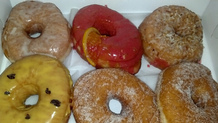
 I have blogged about sugar numerous times - with a focus on corn syrup and high fructose corn syrup. Most of us don't add a lot of sugar to our foods, the problem is with the amount of sugar found in most processed foods. According to Robert Lustig, MD who wrote "Sugar, The Bitter Truth", "Roughly 80 percent of all packaged foods in the United States contain added sweeteners." The problem with all of the sugar we are ingesting is two-fold. Not only does sugar give us empty calories lacking in nutrients, it can deplete our systems leading to a fatty liver and other health concerns, including obesity. When looking at labels, Dr. Lustig states that if you find any kind of sugar listed in the first three ingredients on the label, consider that food a dessert. The sugar is going to cancel out any of the health benefits that would have been in the other ingredients. If you are considering cutting down on your sugar consumption, my first recommendation would be to eliminate high fructose corn syrup, corn syrup, and corn sugar from the foods that you consume. This one change will greatly improve the quality of food that you are ingesting. Be sure to look at labels of foods that you wouldn't think would contain these sugars - even savory foods now add these sugars to the ingredient list. Small steps to health are more attainable, so this is a great item to choose for a New Year's Resolution. Have a great day ~ Shanna
0 Comments
Ultrametabolism by Mark Hyman, M.D.
I talk about sugar a lot - mostly because we are inundated with sugar in the majority of processed foods that we eat. According to Dr. Hyman, the average person eats about 180 pounds of sugar a year - which comes out to about a half pound per person per day. Yikes! If you look at the ingredient list on many foods, it won't look like there is a lot of sugar in the product - This is because the sugar is hidden under names such as corn syrup, dextrose, sucrose, fructose and more. Dr. Hyman recommends looking at the sugar grams on the ingredient list on the following products: Breakfast cereals, salad dressings, luncheon meats (also watch for nitrates), canned fruits, bread, peanut butter, crackers, soups, yogurt, relish, chewing gum, jellies and jams, and frozen desserts. These are a few products that we don't necessarily expect a large amount of sugar, but it is hidden there none the less. If you want to cut back on sugar consumption, I do not recommend switching to artificial sweeteners - there are numerous health concerns that are caused by these products. I first recommend avoiding or eliminating corn syrup, corn sugar, and high fructose corn syrup. This one change can make a huge difference in sugar consumption. Have a great day - Shanna The Blood Sugar Solution by Dr. Mark Hyman
I like Dr. Hyman as an author, and I recommend all of books. His latest book focuses on something that he calls "diabesity". This is a growing issue of diabetes and obesity in our society, which can lead to numerous health concerns. The first area that he focuses on is nutrition. Almost any plan for health that I look at starts with nutrition. Three particular nutrients that many of us are deficient in (and that he has quizzes to determine if you are in his book) are magnesium, fatty acids (fish oil - omega 3's) and vitamin D. These are actually relatively easy to determine, and can make a huge difference if you supplement appropriately. When he discusses nutrition, he points out how much our diets have changed in the past 30-50 years. People today consume an average of a "half a pound of sugar per person per year". This amount of sugar is detrimental to our health. One 20 ounce beverage can have as much as 17 teaspoons of sugar or high fructose corn syrup (HFCS), according to the author. What I find even more alarming, is that "in the last 3- years, the sugar calories we consume from HFCS have increased from 0 percent to 66 percent." These are empty calories found in most processed foods and beverages. Dr. Hyman gives the following reasons why we need to eliminate HFCS from our diets:
|
 RSS Feed
RSS Feed